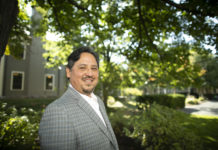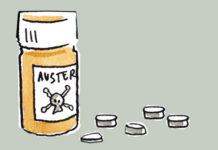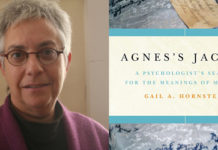Live and Learn: An Interview with Laysha Ostrow
MIA’s Peter Simons interviews Laysha Ostrow about her mental health research and consulting company, the inclusion of peer specialists in mental health care, and her personal experience with the mental health system.
Moving Mental Health Work Away from Diagnosis: Sarah Kamens and Peter Kinderman on New...
MIA's Justin Karter interviews two leaders of the Task Force on Diagnostic Alternatives, a group of mental health professionals who have issued an open letter demanding a new look at psychiatric diagnosis.
Psychology and Poverty: An Interview with APA President Rosie Phillips Davis
MIA’s Gavin Crowell-Williamson interviews psychologist Rosie Phillips Davis about her presidential initiative to address deep poverty.
The Management of Captive Populations with Psychiatric Drugs: An Interview with Anthony Ryan Hatch
Dr. Anthony Ryan Hatch is a sociologist and associate professor of Science in Society, African American studies and Environmental Studies at Wesleyan University, who...
Opening Doors in the Borderlands: An Interview with Liberation Psychologist Mary Watkins
MIA’s Micah Ingle interviews Mary Watkins about reorienting psychology toward liberation and social justice.
Healing Youth with Nature and Connection: An Interview with Peter Mayfield
An interview with Peter Mayfield, founder and Executive Director of the Gateway Mountain Center. Peter talks of his journey from mountaineering to his role as an educator and mentor, and how enabling children and adolescents to connect with nature has such a profound effect on their health and wellbeing.
On Human Rights and Surviving Race: A Conversation with Celia Brown
An interview with Celia Brown: psychiatric survivor, human rights activist, and president of MindFreedom International.
Survivorship, Resistance, and Connection: An Interview with Dorothy Dundas
An interview with activist Dorothy Dundas about her connection to the psychiatric survivor movement from the 1970s to today.
When Healing Looks Like Justice: An Interview with Harvard Psychologist Joseph Gone
MIA’s Ayurdhi Dhar interviews Joseph Gone about how a history of dispossession, conquest, and colonization shapes mental health outcomes in Native American communities.
Climate Change, Mental Health and Collective Action: An Interview with Jennifer Freeman
In an interview with MIA's Akansha Vaswani, narrative therapist Jennifer Freeman calls for a shift away from individualistic approaches to 'eco-anxiety' and toward responses that connect us all to a counter-tsunami of action for the planet.
Tensions in Mental Health Care in China: An Interview with Zhiying Ma
Anthropologist Zhiying Ma explores mental health care in China, including tensions between Western psychiatry and socially-oriented local frameworks.
Addressing the Roots of Racial Trauma: An Interview with Psychologist Lillian Comas-Díaz
MIA’s Hannah Emerson interviews Comas-Díaz on the need for culturally competent care in a medicalized and individualistic society.
Toward a Critical Self-Reflective Psychiatry: An Interview with Pat Bracken
MIA’s Justin Karter interviews critical psychiatrist and philosopher Pat Bracken about the necessity of challenging received wisdom.
Learning a Different Way: An Interview with Maori Psychiatrist Diana Kopua
MIA’s Ayurdhi Dhar interviews Diana Kopua about the Mahi a Atua approach, the global mental health movement, and the importance of language and narratives in how we understand our world and ease our suffering.
The Creation of a Conceptual Alternative to the DSM: An Interview with Dr. Lucy...
MIA's Zenobia Morrill interviews Lucy Johnstone about the reaction to the Power Threat Meaning Framework, her life influences, and her hopes for the future.
Poverty, Pathology and Pills: An Interview with Dr. Felicity Thomas and Dr. Richard Byng
MIA’s Tim Beck interviews Dr. Felicity Thomas and Dr. Richard Byng about their report, Poverty, Pathology, and Pills, which situates increasing rates of mental health diagnosis and psychiatric prescriptions within socioeconomic and policy trends across the UK.
Getting Pharma Out of Medical Education: An Interview with Dr. Adriane Fugh-Berman
MIA's Gavin Crowell-Williamson interviews PharmedOut founder Dr. Adriane Fugh-Berman about Big Pharma's influence on medical education.
Mad Science, Psychiatric Coercion and the Therapeutic State: An Interview with Dr. David Cohen
MIA's Peter Simons interviews David Cohen, PhD, on his path to researching mental health, coercive practices, and discontinuation from psychiatric drugs.
Fighting for the Meaning of Madness: An Interview with Dr. John Read
Akansha Vaswani interviews Dr. John Read about the influences on his work and his research on madness, psychosis, and the mental health industry.
Constructing Alternatives to the DSM: An Interview with Dr. Jonathan Raskin
Dr. Raskin discusses psychotherapists’ dissatisfaction with current psychiatric diagnostic systems and explores alternatives.
The Effects of Antidepressant Exposure Across Generations: An Interview with Dr. Vance Trudeau
Dr. Vance Trudeau discusses his study's finding that antidepressants may have far-reaching, adverse effects that last up to three generations.
Peer-Support Groups Were Right, Guidelines Were Wrong: Dr. Mark Horowitz on Tapering Off Antidepressants
In an interview with MIA, Dr. Horowitz discusses his recent article on why tapering off antidepressants can take months or even years.
First-Person Accounts of Madness and Global Mental Health: An Interview with Dr. Gail Hornstein
Dr. Gail Hornstein, author of Agnes’s Jacket: A Psychologist’s Search for the Meanings of Madness, discusses the importance of personal narratives and service-user activism in the context of the global mental health movement.
Interview: Researcher Runs Trial on Antidepressant Withdrawal
Tony Kendrick, a professor of Primary Care at the University of Southampton, has found through his research and practice that too many people are being prescribed antidepressants long-term without the information and support necessary to get off of them.
Interview: Researchers Deconstruct Ghostwritten Industry Trial for Antidepressant
Researchers, Jon Jureidini, Jay Amsterdam and Leemon McHenry, have taken a closer look at the data from a randomized control trial of citalopram (Celexa) that was ghostwritten and then used by the manufacturers to support claims of the drug’s efficacy and safety in the treatment of child and adolescent depression. To get the background on this story, we connected with Dr. Leemon McHenry, an investigator in this study and a lecturer in philosophy at California State University, Northridge.

































